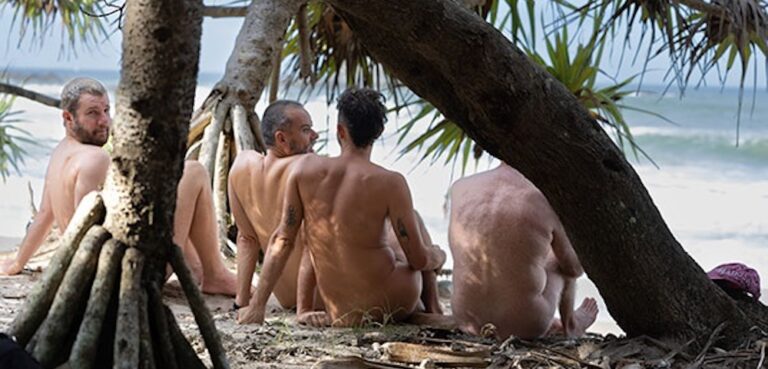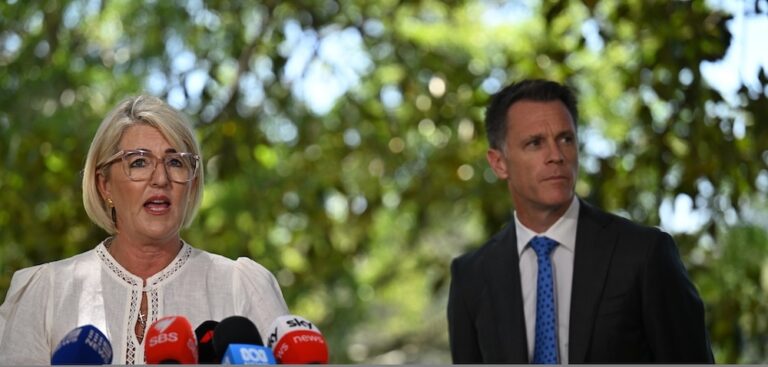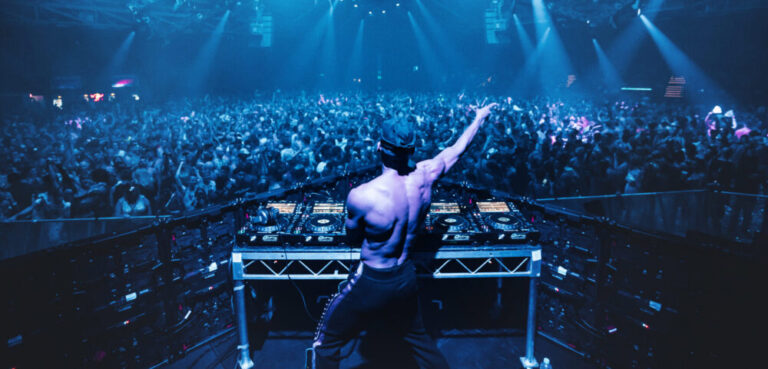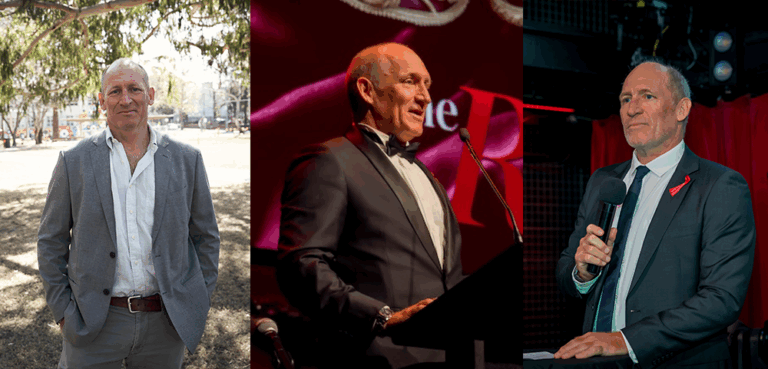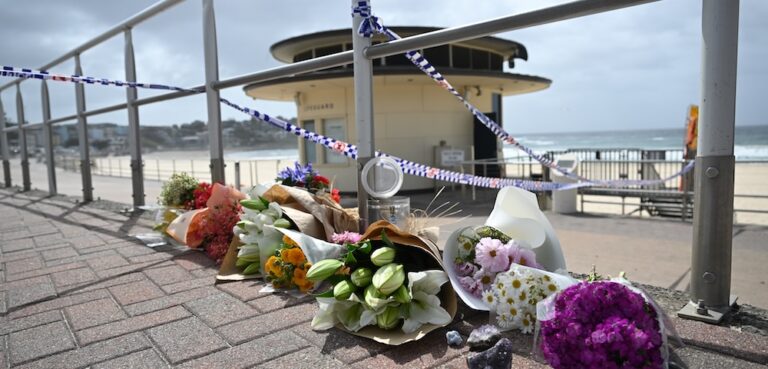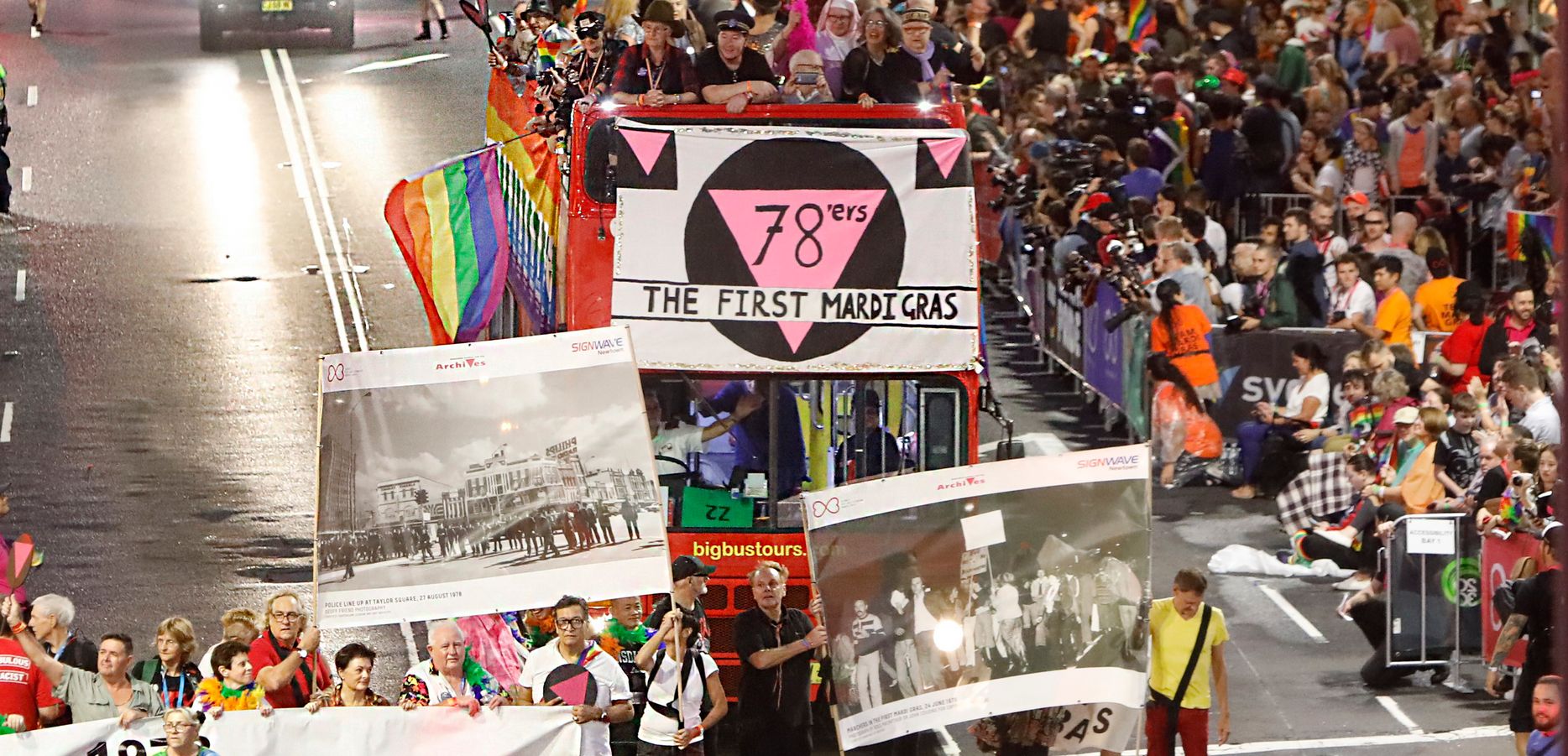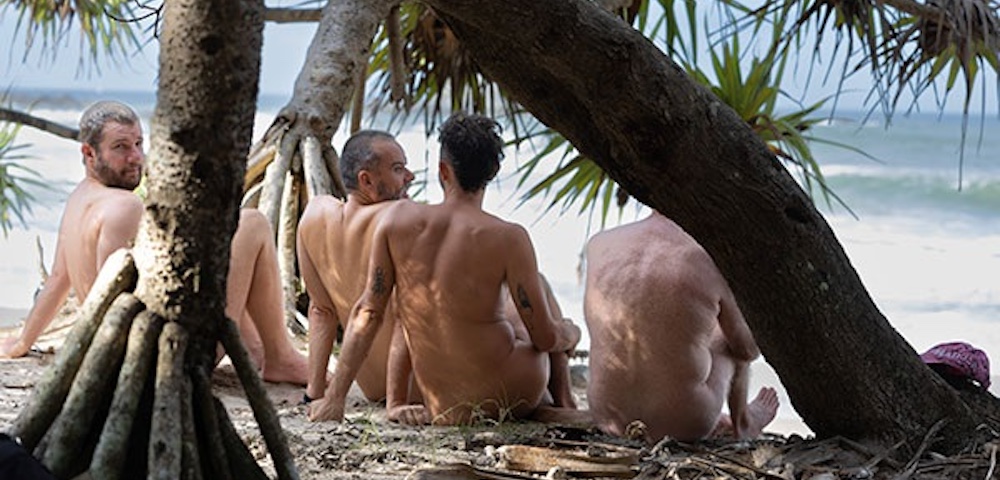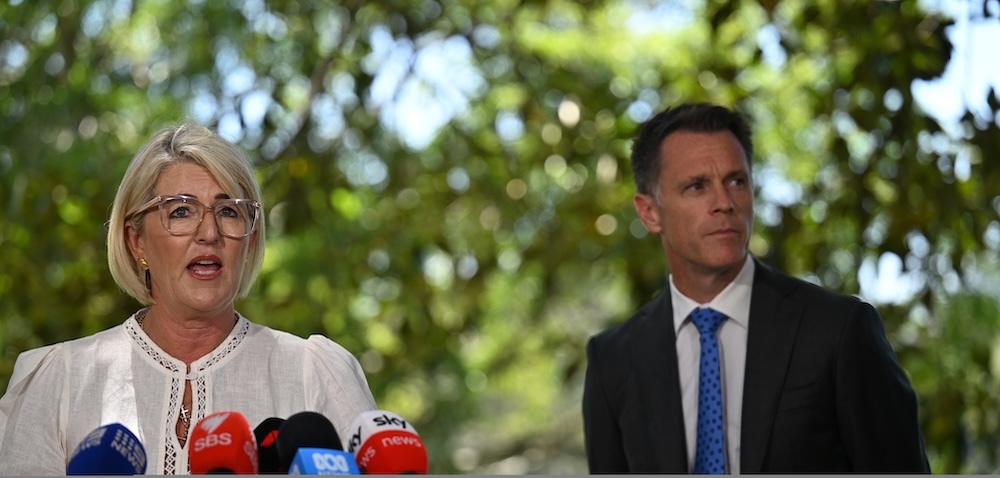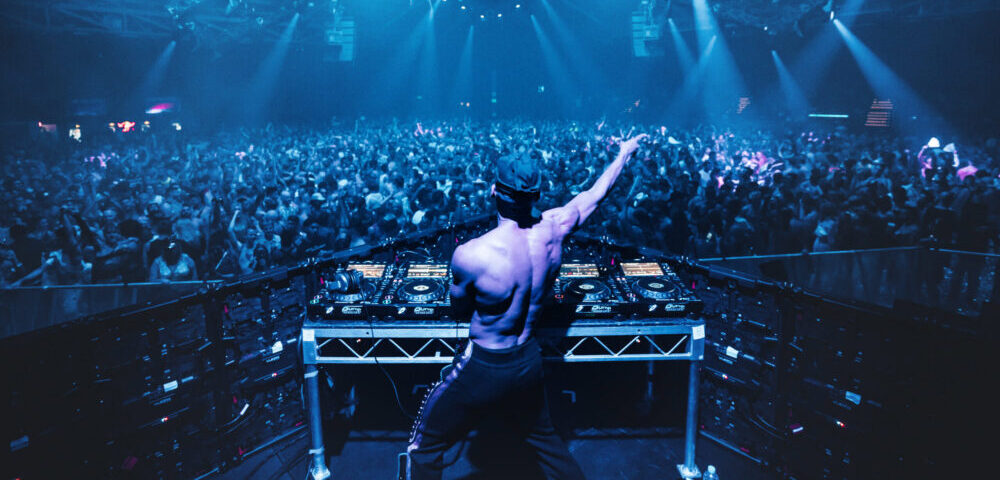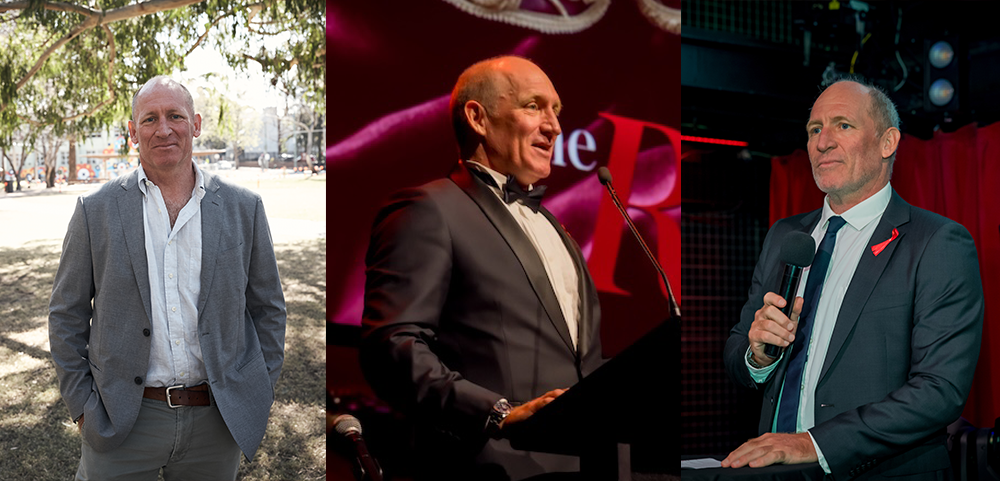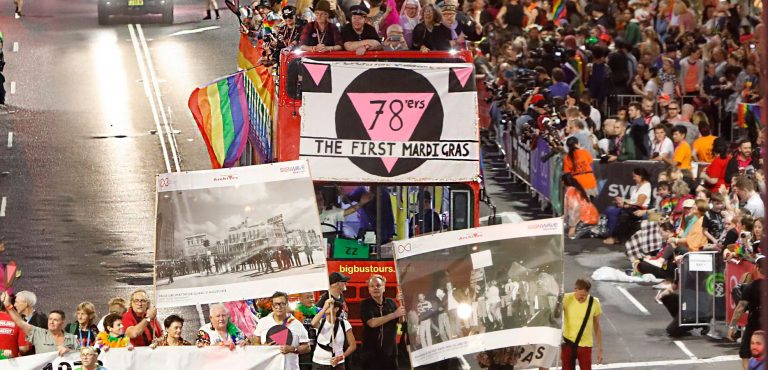
The virus and the Star
Two years into its inception the Sydney Star (as it was then known) ran a story about a new pneumonia (as it was then known).
A type of pneumonia has been found in five young men, two of whom died, and may be linked to some aspect of homosexual lifestyle, was the news from the US Public Health Service’s Center for Disease Control.
That was 1981, and by 1983 the Star ran the headline: Fear and Loathing in America -“ AIDS inevitable here? as rumours of the disease hitting Australia became a reality. The first Australian case of AIDS had confirmed by the Department of Health.
The Star‘s responsibilities were suddenly profound and serious, especially given mainstream coverage that included terms like gay plague (in The Daily Telegraph until 1987) and bowling Grim Reapers.
There were updates on treatments, protests and prevention. There were furious letters, dripping in grief. The Star‘s editor Michael Glynn became part of a media group assigned to present gay views to the mainstream press. Obituaries swelled the pages.
Some of the debates now seem astonishing. From 1984 the issue of whether to take an antibody test was fiercely contentious -“ as the shock of bad news might invoke depression or suicide. (There was little treatment then, except palliative care for the dying.)
By 1988, the advent of AZT meant ACON could finally recommend that it was better the devil you know, although getting AZT to the people was another matter entirely.
The AIDS Coalition To Unleash Power began Acting Up across the nation. AIDS councils lobbied, but many argued AZT was toxic anyway.
By 1997, combination therapies had marked a new era with the prospect of HIV/AIDS as a manageable chronic illness -“ yet the debates were far from over.
We have an unchanged and proven method of prevention (use condoms and water-based lube), and yet HIV infection rates rose again in the 21st century and continue to rise. We don’t know exactly why, but we won’t stop asking.
It is impossible to mark the 25th birthday of Sydney Star Observer without acknowledging HIV/AIDS, but frivolous to address the subject without looking outward.
And so we asked individuals from a variety of perspectives to answer a single question: How has HIV/AIDS affected your life?
Some work with AIDS, some live with HIV, some have found ways of transforming their rage into political change and even beautiful art. Almost all insisted there were other people perhaps better qualified to tell their stories.
The Long-term Survivor -“ David Menadue, author (Positive)
When I was first diagnosed with HIV in 1984, I was 32. I had just purchased my first home, gained an important promotion in my work and was setting myself up for when the right man came along to complete the picture. Instead the virus inserted itself into my otherwise happy existence and turned a number of things on their head. The most significant change for me was in my attitude to sex. For a while I felt a strong feeling of stigma, that I shouldn’t have sex, and if I was prepared to reveal my status to intending partners then, was often rejected anyway. It took a long time living through those sensational 80s -“ with the Grim Reaper setting the scary tone in the background -“ before the gay community and positive people themselves learnt to accept that it was okay to have sex again, that condoms and safe sex worked.
My first AIDS-defining illness at age 37 forced a major re-evaluation of where life was headed for me -“ I had spent much of the 80s in denial that I would get sick and was now being told that I would probably not reach 40. Once I would have been scared at the prospect of reaching 40 -“ but now I wanted it like nothing else. With my T-cells at zero for five years in the early 90s, I’m not quite sure how I did make it through that time with few treatments and the loss of so many friends from AIDS. Each funeral I attended would have me thinking if I was next -“ I was no stronger than my friends who had died and had no reason to believe I would survive. For whatever reason -“ a mixture of luck, good medical advice and maybe some good genes -“ I did make it to 1995 when the new generation proteases helped me and many others turn the corner with our health prospects.
Now at age 52 I can look back and think what might have been if the virus hadn’t entered my life then: maybe life would have been less traumatic, maybe I would have found a life partner more easily, maybe I would have had a more brilliant career but I would still have had to live with HIV in the lives of many of my friends. I have made many wonderful friendships and alliances through my years involved with HIV activism and they have provided me with some of my life’s highlights. It has made me a stronger individual and I hope more compassionate one. And a believer that sometimes in life you can just be lucky -“ when the chips are down -“ and the odds turn in your favour.
The Social Researcher -“ Kane Race, National Centre HIV Social Research
I came to gay life in the 1990s and I find it difficult to imagine such life outside the epidemic. If you wanted to think seriously about gay identity in the 1990s, you had also to think about HIV. For me the politics of sexuality and the politics of medicine are deeply linked.
I am a beneficiary of the amazing public culture that grew out of our community’s response to AIDS and I have an increasingly strong sense of the achievements of that time. I don’t think I would have had the courage to be open about my sexuality without the vibrancy of the HIV/AIDS social movement. It’s not that much of an exaggeration to say that ACON posters made it feel okay to be gay.
I’ve been fortunate enough never to have lost a close friend to AIDS. But HIV comes into our lives in unpredictable and unpredictably challenging ways. My gay generation has reaped the benefits of condom culture and -“ more recently -“ antiretroviral therapies. There is, I think, a growing sense of how precarious that good fortune is.
HIV took me out of a dreary future in an office in the city and sent me in a direction in which it is difficult, sometimes impossible, to distinguish between personal and professional life. That can be hard work, but it’s also a source of energy. HIV/AIDS is one area where the complex intimacies of the body are as publicly relevant as the business of global pharmaceutical corporations, and you need to think both together.
Today I’m involved in setting up one of the first postgraduate coursework programs in Health, Sexuality and Culture. I get to work with students who are passionate about their research in a personal and committed way. That’s one of the remarkable things about this field. You learn to wear your work on your sleeve.
The Physician -“ Dr Cassy Workman
It’s been a rollercoaster. The creativity and excitement of a gay community developing in the 70s and early 80s gave way to a sense of shock in the mid-80s, then to the despair and blackness of the late 80s and early 90s, replaced with the excitement, exhilaration and relief of the mid-90s with the advent of effective therapies. Looking back I am not sure how any of us got through it. Some of those early times I don’t like to think about -“ even now, a decade on, some memories are still too raw, too painful. I’m glad I was in my early 30s at that time, because I don’t think I would be able now to physically do the hours I did then. Finishing work after midnight was common -“ even the norm really, a concept that seems crazy/unbelievable now that I work what seems like a leisurely 70-hour week. Housework and cooking were one of the first casualties to this epidemic, but given how undomestic I am, I didn’t think it was a great loss. My children, though, have paid a price -“ I haven’t been there some/much of the times when I/they think I should have been.
Of course my life would have been different if HIV had not existed or had not happened at that time. The community would have been different too. HIV took many of our most articulate, smartest and most creative. It also took the time and energy from huge numbers of people in this community. Importantly it took many from the very group that could have made the most sense of this epidemic for us -“ our artists and intellectuals. The things that could have been accomplished without this diversion of resources, without the loss of these individuals, would have been phenomenal. I don’t know where this community would have gone -“ what direction, what evolution. I just know it would have been amazing and wish I could have been there.
The Writer -“ Roger Monk, (screenwriter Walking On Water)
As a writer my response to the HIV epidemic was to write a film script, which I realise now in retrospect was as much a catharsis for me as a homage to my best friend. When Anthony died, a tsunami of grief overwhelmed me and I literally felt I was drowning in its wake, no pun intended, and the only means I had to process it was to lock myself away in a bed-sit and bang out a film script. I glibly titled it Live And Die. However, market forces wanted something more benign, market forces always demand that we water down reality and so it became Walking On Water.
What I wanted was to inflict the pain we as a community felt at our lovers, friends and brothers dying on the rest of the world. It was gritty, it was tough, it was uncompromising and it won many awards, though not that many of the rest of the world saw it. AIDS isn’t good box office. However, after a screening at the San Francisco Gay and Lesbian Film Festival at the Castro Theatre, a gay man stood and thanked us for making the first film he’d seen that depicted the reality of his experience at the death of friend after friend after friend.
Mortality is such an anthema when you’re only 30 years old, and what we saw as young men was pain, thwarted dreams and death, but holding the hand of a dying person is a privilege and what we learnt from our friends was courage, humour and a lust for life.
That experience has informed the rest of my life as I tried to live an extra one for Anthony. Everyone has a legacy, everyone has a story and this is mine, one of many millions, insignificant yet crucial.
The HIV-positive woman -“ Carol
I remember reading an article in a magazine about HIV and how if you weren’t in a high-risk group, there was basically very little chance of you getting it. So I thought, well, I’m not a gay male, I don’t inject drugs -“ never have done -“ and I’ve never been a prostitute. So I kind of wrote it off in my mind.
But then I went on this holiday to Thailand about nine years ago and had a holiday romance with a man over there, and ended up living over there for a couple of months. We did start off using condoms and then after a while we just stopped for some reason. It’s like you start to get to know someone and then you stop.
About two years later I thought to myself I’d just get a routine test to see. I don’t know why I did, I just decided to, and it turned out to be positive. I remember before I was diagnosed I was thinking about life and how long it would take and how hard it was: 80 years of this, God life’s hard. After I was diagnosed I remember looking back at that and thinking, oh my God, I hope I’ve got another 50 years. So it really did make me appreciate things more.
I’ve been on treatments for the last two years and I’ve done really well on them but, like everyone else, I still don’t know when I’m going to die. It’s weird. On the one hand I do live in the moment, but on the other hand I make plans, because I know of all these guys who just blew all their money and went around the world and they’re still here 20 years later thinking, Why the hell didn’t I buy a house?
In some ways I think it has given me an appreciation, and I met a partner through it who’s also been positive for many years, so I wouldn’t have met him without it too.
The Activist -“ Adam Carr
Twenty years ago this week, I got up at a public meeting in Melbourne and proposed the formation of the Victorian AIDS Council, an organisation which has since saved thousands of lives and helped many thousands of people deal with all the myriad effects of the AIDS epidemic. The previous year the AIDS epidemic had burst on the Melbourne gay community like a bolt of lighting -“ unsuspected, terrifying, incomprehensible. Although actual AIDS cases were few at first, their impact was enormous. Who would be next? How could this be happening?
AIDS dominated my life for the next 10 years. I served on the VAC committee until 1988, was on the committee of AFAO and various state and federal advisory bodies. I went to conferences, lobbied ministers and bureaucrats, argued with professors and archbishops. I wrote extensively about AIDS in the gay press and also for the mainstream media. At one point I stood outside St Patrick’s Cathedral dressed as the Pope -“ I forget why now. For a while, as VAC’s media spokesperson, I was the gay community’s cheery and optimistic public face -“ I certainly wasn’t feeling very cheery or optimistic. I don’t know how many funerals I went to in that decade: not as many as some people I knew in Sydney, but more than enough.
I look back on what Dr Neal Blewett has called the heroic period of AIDS activism with a certain amount of satisfaction, although it is not a decade I would want to live through again. The Australian gay male community acted quickly, intelligently and effectively to save itself, both from the epidemic and from the political and social backlash it triggered. We made a lot of mistakes, and we lost a lot of fine people along the way. But we built a response that was among the best in the world, and most of us lived to tell the tale.
The Volunteer -“ Nathan Clunas, Community Support Network
I have been a volunteer with the Community Support Network of NSW (CSN) for two and a half years. CSN is a volunteer-based community organisation that provides home-based care and practical assistance to people living with HIV/AIDS, and is affiliated with ACON. Its main aim is to support people living with HIV/AIDS to lead independent lives in the community. When I started with CSN I was trained over a weekend as a carer and then assigned a client who was living with HIV/AIDS. On a weekly basis I would go shopping with my client and help clean my client’s home. This amounted to roughly two hours per week and I found this role hugely rewarding. I have always been interested in committee work and soon after joining CSN I was elected onto the Carer’s Representative Committee. The committee works closely with the CSN/ACON office staff and also organises events for the carers, including movie nights, parties, a float in the Mardi Gras parade and fundraising events like selling ice-creams at Mardi Gras Fair Day. Over time my work on the committee increased and I had to take a break from caring. In 2003 I was elected as president of the committee.
From speaking with carers who have been with CSN for a number of years, it’s clear that the role of volunteers in the epidemic has changed significantly. Volunteer carers are less likely to be involved in a palliative care role with their client at present. Of course, this was very different 20 years ago.
Obviously the news that you are positive can never be welcome, but being positive now compared to finding out 20 years ago must be a far less frightening prospect thanks to the new treatments available. There are well-established networks and organisations run specifically for people living with HIV, and one can only be hopeful of the research being performed right now on vaccines.
The Solicitor -“ David Puls, HIV Legal Centre
On a personal level, HIV means that sex now involves negotiation -“ something that’s true for us all. Negotiation isn’t easy, or sexy. It’s not intimate. Working as a lawyer and knowing the law around disclosure, and seeing the consequences of both disclosing and not, I’m particularly aware of how difficult the negotiation process is, and how sexy it isn’t when viewed in terms of its legal consequences.
From a professional point of view, I’ve been a commercial solicitor and had experience elsewhere in the community sector, but working with HIV-related legal issues has given me the opportunity to work with an epidemic that affects me personally. That makes me passionate about my work.
HIV creates division, and there are times when I get very frustrated. I don’t understand why there needs to be division between rich and poor, between drug companies and those that can’t access medication, or between those that support and those that vilify. Compassion isn’t difficult -“ it’s a choice. When people choose hate or division over supporting or helping, I don’t understand.
Things have changed. The work I do now is more involved with people moving forward and wanting to change things -“ workplace issues, immigration, insurance, discrimination. On the other hand, when I first started in the sector more of my work involved illness, medical issues, hospital visits, and being too ill to work. Obviously the change in work is great, but there is lots more to be done so that we can keep moving forward. It shouldn’t be so difficult for HIV-positive people to live in this country or to get accident insurance. And we shouldn’t have to live with the amount of ignorance and discrimination that we still have to put up with.
The President -“ Adrian Lovney, ACON
HIV/AIDS first impacted on me when my first proper boyfriend died at a very young age. It was the early 90s in Brisbane -“ post-World Expo 88 and in the early days of the reformist Labor government which was dragging Queensland from the depths of decades of conservative, often vicious, government. Homosexuality was about to be legalised and anti-discrimination laws were the next big thing.
There were two things I remember most: the palpable sense of fear and prejudice that people with HIV/AIDS and to a lesser extent gay and lesbian Queenslanders felt at that time, and an equal but opposite reaction among our communities.
It was both empowering and intoxicating. We mobilised to take care of our own through the community-based Queensland AIDS Council, which ran a first-class homecare program and innovative and in-your-face education campaigns. We marched on the streets to demand equal rights under the law. And for perhaps the first time in my life I felt part of a community that was supportive and nurturing.
With apologies to Chrissie Amphlett, it’s therefore been a story of pleasure and pain. Being part of the HIV/AIDS sector over 14 years has meant I’ve lost more friends and attended more funerals than I might otherwise have done.
But more than this, because of this, my life has also fundamentally changed. I’ve seen things and done things I would never have known otherwise. My political consciousness was overhauled and it continues to evolve. I’ve marched on the streets, I’ve been arrested, and I’ve seen laws changed. I’ve worked with, loved and learnt from some of the most outstanding people in Australia and elsewhere -“ breathtaking intellects, passionate and committed individuals, extraordinary leaders and ordinary people who have given hundreds of hours of their time in volunteering. And I’ve seen our community build and maintain a unique and world-leading response to HIV/AIDS and other health issues.
Perhaps even more than the epidemic itself, watching our communities’ response to it has affected me to the core.
